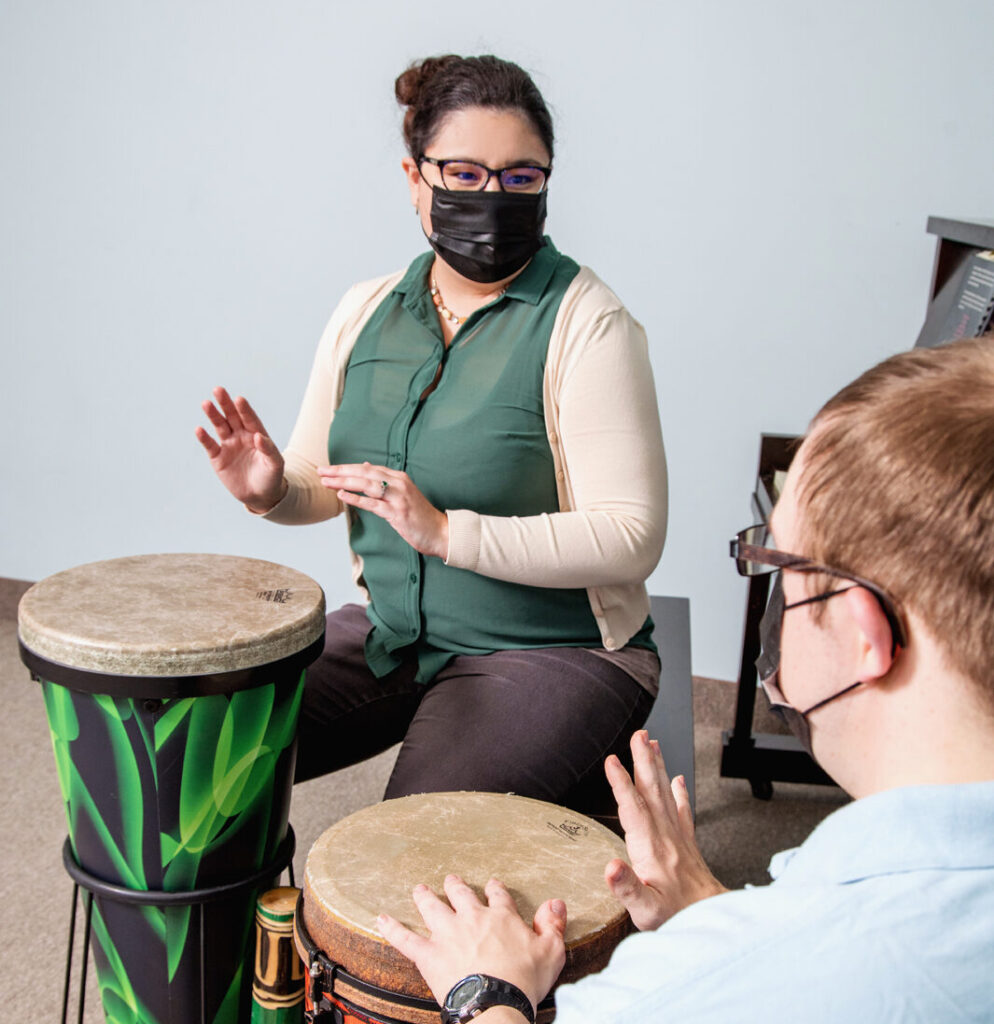Inclusive Mental Health Care

Mental health care is an important part of wellness. But what about clients with barriers? What exactly are inclusive mental health services? Why are they important? And how is music therapy an inclusive mental health service?
Everyone has mental health just like everyone has physical health. Sometimes we are well and other times we visit with a doctor or mental health practitioner to tend to something that is ailing us. More and more people are actively tending to their mental health. For most this is a fairly straight forward process. We make an appointment with a social worker, psychotherapist, or psychologist. Then we go and talk about what may be interfering with our mental wellness. Talking to a therapist is a valuable and effective service.
There are many life events or circumstances that prompt people to seek mental health services. These can include coping with loss such as the death of a loved one, or the loss of independence or abilities due to injury or illness. It could also include processing trauma such as being the victim or witness of a crime, or the trauma associated with discrimination related to your race, culture, or disability.
Who Needs Inclusive Mental Health Services?
For a second lets consider the mental health needs of a fictional senior with dementia, we will call her Betty. Betty has dementia and was being cared for at her home with her husband. Unfortunately Betty’s husband recently died of a heart attack prompting her move into a long-term care facility. Inside of a few short weeks Betty lost her husband, her home, and all the things that were familiar to her. I think we can all agree that these circumstances require emergent mental health services.
Lets also consider the mental health needs of a fictional child with developmental disabilities, we will call him Alex. Alex has a developmental delay. He is involved in Speech Therapy, Occupational Therapy, and Physiotherapy to help him achieve developmental milestones that for most children come naturally. Alex struggles socially at school because he is different. He is frustrated because his peers don’t seem to have the same challenges. Alex can’t communicate what he is feeling because his speech development is significantly delayed.
These fictional people exist. And they exist in great numbers. These are people who exhibit a high need for mental health support. However, they would most likely not benefit from traditional talk therapies. Both of these “clients” lack the ability to talk about the things that are interfering with their mental wellness in a traditional sense. Yet their mental health still requires tending to. This is why inclusive mental health services are important.
Clients with Dementia
Lets return to Betty and consider two possible outcomes. Without mental health services that can appropriately support Betty’s wellbeing she will struggle. Betty may develop pronounced depression and withdrawal from activities and programs in the home. She may exhibit more incidences of agitation and aggression to the people that care for her. And although her long-term care facility is doing everything in their power to provide Betty with the best possible care, she does not have access to mental health services by a licensed practitioner.
An alternate outcome for Betty is one where she has access to music therapy. Her home makes a referral to their music therapist who is a registered psychotherapist. The music therapist realizes that Betty is struggling and isn’t able to talk about it. They use music and a therapeutic relationship to allow Betty to express her emotions without words. She sings and cries and smiles and laughs. Music allows her to revisit some of her most cherished memories and connect with pieces of her life that offer comfort and familiarity. Betty uses musical expression as a cathartic exercise to get out her frustration and agitation by banging on a drum. Most importantly, the music therapist carefully selects the most appropriate songs and music to support Betty in processing her feelings of grief, loss and confusion.
Clients with Developmental Disabilities
Now lets take a closer look at Alex. One outcome includes a strong focus on his development. He attends multiple appointments every week. Sometimes his therapy appointments occur at school, but he often has appointments after school as well. He is making gains but mom and dad report that he doesn’t enjoy going to his therapy appointments. Life is harder for Alex than his peers. Everything takes more effort and more time for him to achieve.
Now lets look at an alternate outcome for Alex, where he can access inclusive mental health services. Alex’s family refers him to a music therapist. They gather a history from the family and examine the treatment plans and goals his other therapists are working on. Then the music therapist creates an environment where Alex gets to experience joy and success just as he is. They use songs and instruments to builds his confidence. Alex starts to take risks and try new things in music therapy. He learns that feeling successful doesn’t have to be tied to achieving his developmental goals. Alex loves music therapy and mom and dad report it his his favourite appointment each week. The music therapist slowly starts to include musical activities that support the goals in his other therapies. Approaching his goals with a positive mindset and from a different perspective helps Alex achieve his goals.
I have worked for almost two decades as a music therapist. I have learned that everyone has feelings and emotions. They are felt by everyone no matter our ability or disability. Seniors with dementia feel loss and confusion, just like children with disabilities feel frustrated and isolated. Music therapy offers an effective and inclusive means to support the mental health needs of our vulnerable populations.
By: Heidi Flynn, RP, MTA
